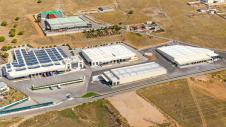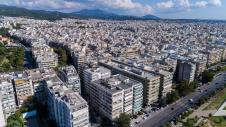The real estate market is faced with large increases in the price of materials and a shift in priorities as a result of the pandemic and the changes it brought about.
As the CEO of Dimand, Dimitris Andriopoulos, said, the market was faced with a "tsunami" in construction costs that "is not linked to the war in Ukraine. It started in April 2021, as a result of the effects of the pandemic."
In particular, according to Andriopoulos, the price increases began in April 2021 when the first clouds began to appear in supply chains and were made worse by the surge in energy prices. At the same time, the shortage in the work force led to higher labor costs. "We felt it within 60 days, as suddenly as a tsunami," he noted, stressing that in just two months there was a cost increase of up to 40%.
In addition to the increases in the prices of materials, the real estate market saw a series of other changes during this time, such as the need for more logistics spaces, as many physical stores have been replaced with warehouses because of the surge in online shopping. At the same time, many switched to larger homes to buy or rent, compared to pre-pandemic data, while the number of digital nomads who choose Greece to work and live increased.
However, there were also great changes in office spaces. According to the head of Dimand, the concept of the office has now changed radically, creating the need for bioclimatic-type office buildings of high standards. Stressing that the tendency to have a demand for a specific type of real estate will continue, he said that "in the past the specifications for a new office building were five pages and today they reach 100 pages". He noted that Dimand is already active in the development of 40% of LEED-certified green buildings in the country.
Companies absorb higher prices
According to Andriopoulos, the rise in interest in green office buildings that were also sought by real estate investment companies (REIC) led to a parallel increase in rents, thus leading to the absorption of increased construction costs and ultimately to the balancing of the market.
The area of Maroussi is indicative of the increases in office rents. As Andriopoulos said, rent for offices of high standards – such as a "green" LEED certificate- jumped from 17 - 18 euros to 26 - 27 euros.
However, in order to avoid the bubble phenomenon, Athens should remain competitive compared to other markets such as Milan, Barcelona, Budapest, Bucharest, Munich or Lisbon. As Andriopoulos said, the price of green modern offices should be kept lower than the prices of these markets, in order to maintain the balance of the market. In fact, he referred to Dimand's strategy of developing properties that keep costs about 20% lower than the corresponding European markets.









